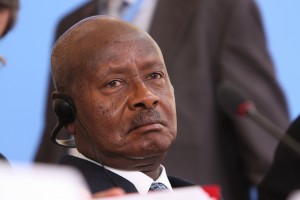EAC gives Museveni 6 months to wrap up EU deal

On behalf of the EAC, Museveni has been asked to reach out to the European Union and end the impasse over a new trade deal.
May 22—The East African Community (EAC) Summit agreed that in six months, Kenya will be given the green light to pursue bilateral talks with the European Union (EU) to save its annual one billion dollar-plus horticultural and floriculture exports business from EU tariffs.
This is unless Uganda’s President Yoweri Museveni cannot find a compromise that involves all EAC members signing the EU’s Economic Partnership Agreement (EPA) which guarantees preferential treatment for regional exports to the EU market on duty-free terms.
An Summit communique reads in part, ‘In the event that an acceptable way is not reached with the EU within the next six months, the Chairperson was authorised to explore the use of variable geometry in implementation of the EPA by EAC member states working with the Council of Ministers. The Summit also agreed that the EU sanctions on Burundi should be discussed alongside the EPA discussions’.
‘Variable geometry’ is a term aptly developed by the EU which basically means if there are irreconcilable differences among countries and a failure to reach an agreement then those countries wishing to pursue a given goal may do so, while allowing those opposed to hold back. The EAC adopted a similar approach with the Single Tourist Visa which Burundi and Tanzania have yet to join.
In a nutshell the EPA is an arrangement where the EU immediately opens up its markets, but allows its partners in Africa, the Caribbean and Pacific (ACP) region to maintain long transition periods before opening up partially to EU imports while providing protection for sensitive sectors. Trade with ACP countries represents more than 5% of EU imports and exports.
In 2016, the EAC exported just over $2 billion worth of goods while the EU sold nearly $4 billion to the region. As Least Developed Countries (LDCs) Burundi, Rwanda, South Sudan, Tanzania and Uganda can still do business with the EU on these favourable terms without signing the EPA.
However given Kenya’s relatively more advanced economy, the country does not qualify for LDC status. Unless the EAC signs as a bloc, Kenya’s presently competitively priced fresh produce, like French beans and cut-flowers, will be subject to import duty in the EU. That will make Kenyan products more expensive.
Tanzania says even with long transition periods, EU products will swamp domestic manufacturing and industry, so it is not sensible for them to sign. Burundi, which is under EU sanctions, will not sign until these are lifted. Uganda has been waiting for a compromise that has failed to materialise.
Signing the EPA has been a major sticking point that has divided the EAC since late last year, when Kenya and then Rwanda signed unilaterally in Brussels. It was one of major reasons why the 18th Summit has been repeatedly postponed until last weekend. However, only two Presidents out of six turned up for the Summit hosted by President John Magufuli who later handed the Chairman’s gavel to President Yoweri Museveni.
Absent were President Pierre Nkurunziza (Burundi), President Uhuru Kenyatta (Kenya), President Paul Kagame (Rwanda) and President Salva Kiir (South Sudan).
However representatives of the absentees, agreed that during the next 30 days Museveni should, ‘…reach out to the European Union to communicate the EAC circumstances’.

 African Heads of state head to South Korea next week for Summit talks
African Heads of state head to South Korea next week for Summit talks
 Trading leads as main source of income for Ugandans
Trading leads as main source of income for Ugandans
 New leadership for bankers’ umbrella as total assets top $12 billion
New leadership for bankers’ umbrella as total assets top $12 billion
 Brussels Airlines to announce Nairobi service
Brussels Airlines to announce Nairobi service
 SITA promises enhanced travel experience after Materna acquisition
SITA promises enhanced travel experience after Materna acquisition
 Saudia’s 105 aircraft order stretches A320neo lead over rival Max
Saudia’s 105 aircraft order stretches A320neo lead over rival Max
